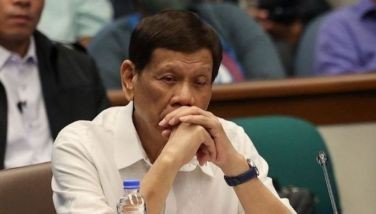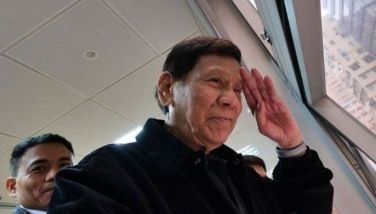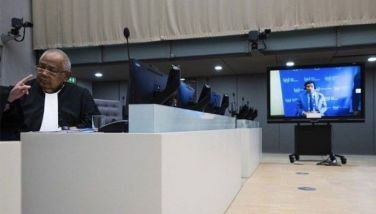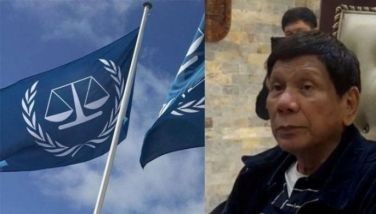US-Phl talks open; Gov't assures 'territorial integrity' in deal
MANILA, Philippines - As the formal negotiations on an increased rotation presence of United States troops in the country start on Wednesday, government negotiators said they will uphold the country's welfare despite criticisms on the move.
"We would like to assure the Filipino people that your government is committed to defending and protecting the country’s sovereignty and territorial integrity," said Foreign Affairs Assistant Secretary Carlos Sorreta, the head of the Philippine negotiating panel.
Besides Sorreta, Defense Undersecretary Pio Lorenzo Batino, Justice Undersecretary Francisco Baraan III and Defense Assistant Secretary Raymund Quilop are the members of the Philippine negotiating team.
Representing the US are Senior Advisor for Security Negotiations and Agreements Eric John, Department of State Attorney Advisor Elizabeth Jones, Department of Defense's Brig. Gen. Joaquin Malavet and Deputy Legal Counsel Capt. Greg Bart.
The proposed framework agreement would extend the Mutual Defense Treaty and the Visiting Force Agreement allowing US military forces to have joint training and be present in Philippine bases. The first round of the negotiations was held at the Defense department building in Camp Aguinaldo.
Sorreta said the deal would be a "milestone" in the country's strategic ties with the US especially in terms of national defense.
"We will come to the negotiating table guided by the Philippine Constitution, utmost respect for sovereignty, and mutuality of benefits in any approved activity and deployment of equipment," he added.
He also said the public can expect to be informed of details on each round of talks through the media.
“I exhort both panels to remain candid and frank so that the outcome of this undertaking will redound to the best interest of our two countries,†Defense Undersecretary Honorio Azcueta said before the start of the negotiations.
The first round of talks started at 10 a.m. and ended at about 3:30 a.m. Minutes of the meeting was unavailable as of Wednesday afternoon but officials are expected to hold a press briefing on the matter Thursday.
The Communist Party of the Philippines (CPP) said the negotiations are nothing but a “masquerade†that would formalize the US’ use of the Philippines as a military base.
“The plan to grant the US greater military access to local ports and infrastructure and extending rights to set up its own facilities has long been agreed upon by the Aquino government and the US military,†CPP said in a statement.
The group said the arrangement was clinched during the Strategic Defense Dialogue held in Washington in January 2012 right after the US declared its strategy to pivot towards Asia.
“Considering that the US has long been granted access by the Aquino regime, the current round of negotiations will likely result in allowing the US to have exclusive access to certain facilities, which is a step further in formally allowing the return of the US military bases,†CPP said.
Officials have denied that the framework agreement would lead to a permanent presence of US troops in the country. They have also clarified that the deal would not involve the establishment of new US bases.
CPP said expanding the US presence in the Philippines would violate the country’s sovereignty.
“The Filipino people must firmly unite to oppose and put an end to the permanent presence of interventionist US troops in the Philippines and the rotational docking of US warships,†it added.
Renato Reyes, secretary-general of the Bagong Alyansang Makabayan, said the rotational presence is a convenient way of circumventing the constitution, which bars the establishment of new foreign bases.
“One batch leaves while another takes their place. That’s still permanent and continuing presence, or de facto basing that violates the constitution. We are likely to get the shorter end of the stick in these negotiations,†Reyes said in a statement.
The agreement is expected to set parameters for activities that can be undertaken by the two countries.
Officials said the Philippine negotiating panel would be guided by the following principles: strict compliance with the Philippine Constitution, laws, and jurisprudence, Philippine sovereignty, non-permanence of US troops in Philippine territory, non-exclusivity of use of facilities by the US side, and mutuality of benefits.
US forces were asked to vacate Philippines military bases in 1992 after the Philippine Senate rejected a proposed extension of they stay in the country.
Threats of Chinese incursions in recent years, meanwhile, prompted the government to reconsider greater access for American troops.
Malacañang, meanwhile, insisted that impending agreement will not grant permanent presence of US forces and will be after "high impact and high-value exercises that will benefit both sides."
Related story: Palace: No pemanent presence for US troops
- Latest
- Trending






























